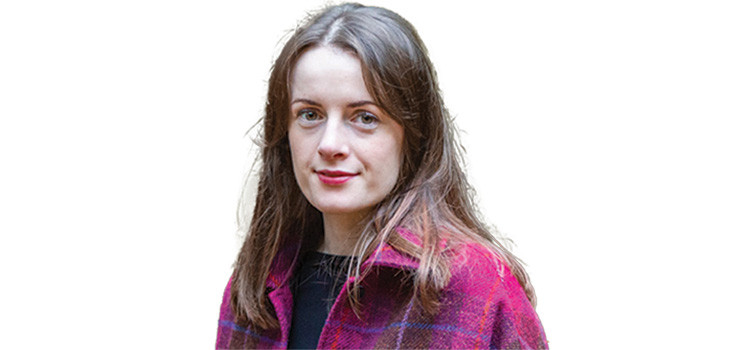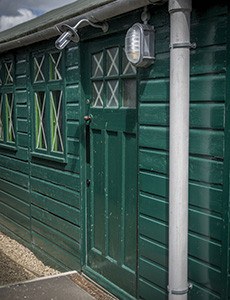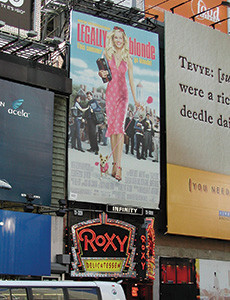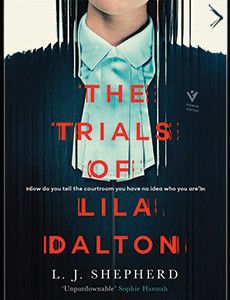*/

An old boyfriend once told me that, while my general knowledge did not impress him (he was on University Challenge, so it did seem unfair that he should judge me), he was envious of my knowledge of pop culture. It pains me to admit that he may have had a point. Whereas he enjoyed highbrow ‘entertainment’, I was happy to watch sitcoms all day. When it comes to my cultural influences, the temptation is to spend my word count listing the best things that have ever been written. Instead, I will try to restrict this article to the things that inspired me to become a barrister-come-author.
My degree was in English Language and Literature and only after university did I decide to convert to law. My first love was reading. I am a child of the Harry Potter generation, and those novels first ignited my passion for reading. Favourite novels from my teenage years include The End of Mr. Y by Scarlett Thomas; an extremely weird but wonderful novel about a PhD student who finds a rare book in a second-hand bookshop which takes her on a journey through the troposphere. Another book about books, The Angel’s Game by Carlos Ruiz Zafón, is a gothic masterpiece and the first psychological thriller I ever read. He combines the bildungsroman storytelling of Dickens with the cinematic thrills of Hitchcock. More recently, I have loved The Seven Deaths of Evelyn Hardcastle, which was a tremendous influence on my writing. A high concept thriller that takes the best tropes of an Agatha Christie murder mystery and combines them with a science fiction plot akin to Philip K Dick’s best work. The Rose Code by Kate Quinn is another of my favourite novels from recent years. I have become a Second World War history fanatic and one of my favourite things to think or read about is life at Bletchley Park (see also: Robert Harris’s Enigma). Bletchley Park is like a glitch in the matrix: a place and time where women were not equal but certainly more respected, neurodivergent people were the rock stars, and hitherto forbidden relationships between people of the same sex an open secret. Although the magic of Bletchley Park vanished after the war, I find pleasure in exploring that realm through fiction. Lastly, a book that inspired me to be a barrister: Great Expectations by Charles Dickens. Dickens does not portray life at the Bar as glamorous, nor did it meet with Pip’s great expectations, but there was something about the studious drudgery in the Temple that appealed to me.
Turning next to television, I am more a fan of the smaller screen than I am of cinema. Growing up, I loved watching detective shows with my parents: A Touch of Frost, New Tricks, Jonathan Creek, Silent Witness, and Inspector Morse were favourites. As an adult, I have been drawn to high concept ideas with enchanting ensemble casts. All of my favourite TV programmes are cancelled after two series. This does not bode well for my career as a novelist. These cult phenomena include Utopia (2013), Sense8, and Dirk Gently’s Holistic Detective Agency. More successful shows include Black Mirror and Mare of Easttown, the latter being a return to my crime procedural roots. I’m also a big fan of sitcoms, The Office (UK) and The Thick of It having shaped my sense of humour.
While I can’t confess to being a film buff, one film that had an enormous impact on me was The Big Short. Mark Baum’s prophetic line at the end of the movie ‘I have a feeling in a few years […] when the economy tanks, they will be blaming immigrants and poor people’ has stayed with me. Other films I adore include Christopher Nolan’s Inception and Memento. He is a wonderful storyteller, combining high concepts with fast-moving plots. On the comedic side, you can’t go wrong with The Full Monty and Cool Runnings. Finally, the movie that had more influence on my wish to become a barrister than any other is – to my shame – Legally Blonde. The final cross-examination is electric. To my mind, as exciting as Tom Cruise’s questioning of Jack Nicholson in A Few Good Men. There is something very comforting about the message of Legally Blonde. While I can’t confess to being a rich Cali Girl, the central meaning of the film is broader; there’s no such thing as the perfect lawyer. What makes the profession a privilege to be a part of are the range of unique characters who bring their own style to bear.

One of Laura’s favourite things to think or read about is life at Bletchley Park.



An old boyfriend once told me that, while my general knowledge did not impress him (he was on University Challenge, so it did seem unfair that he should judge me), he was envious of my knowledge of pop culture. It pains me to admit that he may have had a point. Whereas he enjoyed highbrow ‘entertainment’, I was happy to watch sitcoms all day. When it comes to my cultural influences, the temptation is to spend my word count listing the best things that have ever been written. Instead, I will try to restrict this article to the things that inspired me to become a barrister-come-author.
My degree was in English Language and Literature and only after university did I decide to convert to law. My first love was reading. I am a child of the Harry Potter generation, and those novels first ignited my passion for reading. Favourite novels from my teenage years include The End of Mr. Y by Scarlett Thomas; an extremely weird but wonderful novel about a PhD student who finds a rare book in a second-hand bookshop which takes her on a journey through the troposphere. Another book about books, The Angel’s Game by Carlos Ruiz Zafón, is a gothic masterpiece and the first psychological thriller I ever read. He combines the bildungsroman storytelling of Dickens with the cinematic thrills of Hitchcock. More recently, I have loved The Seven Deaths of Evelyn Hardcastle, which was a tremendous influence on my writing. A high concept thriller that takes the best tropes of an Agatha Christie murder mystery and combines them with a science fiction plot akin to Philip K Dick’s best work. The Rose Code by Kate Quinn is another of my favourite novels from recent years. I have become a Second World War history fanatic and one of my favourite things to think or read about is life at Bletchley Park (see also: Robert Harris’s Enigma). Bletchley Park is like a glitch in the matrix: a place and time where women were not equal but certainly more respected, neurodivergent people were the rock stars, and hitherto forbidden relationships between people of the same sex an open secret. Although the magic of Bletchley Park vanished after the war, I find pleasure in exploring that realm through fiction. Lastly, a book that inspired me to be a barrister: Great Expectations by Charles Dickens. Dickens does not portray life at the Bar as glamorous, nor did it meet with Pip’s great expectations, but there was something about the studious drudgery in the Temple that appealed to me.
Turning next to television, I am more a fan of the smaller screen than I am of cinema. Growing up, I loved watching detective shows with my parents: A Touch of Frost, New Tricks, Jonathan Creek, Silent Witness, and Inspector Morse were favourites. As an adult, I have been drawn to high concept ideas with enchanting ensemble casts. All of my favourite TV programmes are cancelled after two series. This does not bode well for my career as a novelist. These cult phenomena include Utopia (2013), Sense8, and Dirk Gently’s Holistic Detective Agency. More successful shows include Black Mirror and Mare of Easttown, the latter being a return to my crime procedural roots. I’m also a big fan of sitcoms, The Office (UK) and The Thick of It having shaped my sense of humour.
While I can’t confess to being a film buff, one film that had an enormous impact on me was The Big Short. Mark Baum’s prophetic line at the end of the movie ‘I have a feeling in a few years […] when the economy tanks, they will be blaming immigrants and poor people’ has stayed with me. Other films I adore include Christopher Nolan’s Inception and Memento. He is a wonderful storyteller, combining high concepts with fast-moving plots. On the comedic side, you can’t go wrong with The Full Monty and Cool Runnings. Finally, the movie that had more influence on my wish to become a barrister than any other is – to my shame – Legally Blonde. The final cross-examination is electric. To my mind, as exciting as Tom Cruise’s questioning of Jack Nicholson in A Few Good Men. There is something very comforting about the message of Legally Blonde. While I can’t confess to being a rich Cali Girl, the central meaning of the film is broader; there’s no such thing as the perfect lawyer. What makes the profession a privilege to be a part of are the range of unique characters who bring their own style to bear.

One of Laura’s favourite things to think or read about is life at Bletchley Park.




The Bar Council is ready to support a turn to the efficiencies that will make a difference
By Louise Crush of Westgate Wealth Management
Marie Law, Director of Toxicology at AlphaBiolabs, examines the latest ONS data on drug misuse and its implications for toxicology testing in family law cases
An interview with Rob Wagg, CEO of New Park Court Chambers
What meaningful steps can you take in 2026 to advance your legal career? asks Thomas Cowan of St Pauls Chambers
Marie Law, Director of Toxicology at AlphaBiolabs, explains why drugs may appear in test results, despite the donor denying use of them
The appointments of 96 new King’s Counsel (also known as silk) are announced today
Ready for the new way to do tax returns? David Southern KC continues his series explaining the impact on barristers. In part 2, a worked example shows the specific practicalities of adapting to the new system
Resolution of the criminal justice crisis does not lie in reheating old ideas that have been roundly rejected before, say Ed Vickers KC, Faras Baloch and Katie Bacon
With pupillage application season under way, Laura Wright reflects on her route to ‘tech barrister’ and offers advice for those aiming at a career at the Bar
Jury-less trial proposals threaten fairness, legitimacy and democracy without ending the backlog, writes Professor Cheryl Thomas KC (Hon), the UK’s leading expert on juries, judges and courts